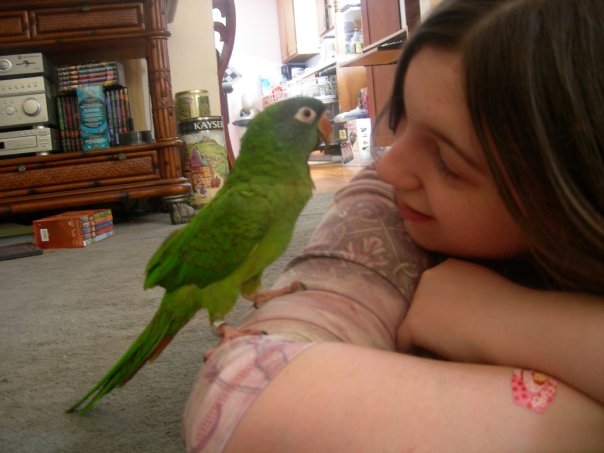Key Takeaways
-
Adopting a blue-crowned conure can bring a sociable and engaging pet into your life.
-
Blue-crowned conures have a lifespan of 20-30 years, so consider the long-term commitment.
-
The cost of a blue-crowned conure can vary, typically ranging from $200 to $600, depending on where you adopt.
-
These birds are known for their ability to mimic speech, though clarity and vocabulary will vary.
-
Responsible pet ownership includes providing proper care, diet, socialization, and mental stimulation for your conure.
Discover the Joy of Blue-Crowned Conure Companionship
When you’re considering adding a feathered friend to your family, a blue-crowned conure is a charming choice. These birds are not just beautiful to look at, but they’re also packed with personality. They thrive on social interaction and can form deep bonds with their human companions. It’s like having a friend who’s always excited to see you and never runs out of things to say—or, in this case, chirp.

“Blue-Crowned Conures as Pets: Featuring …” from threebirdsandacloud.wordpress.com and used with no modifications.
Distinct Traits That Make Blue-Crowned Conures Exceptional Pets
Blue-crowned conures stand out with their striking blue heads and vibrant green bodies. But their physical beauty is just the beginning. These birds are known for their intelligence and affectionate nature. They love to play and can be quite comical, which is why they often become the center of attention in any home. Moreover, they are adaptable and can learn to coexist with other pets, provided proper introductions and supervision are in place.
Understanding the Longevity of Blue-Crowned Conures
Before you decide to adopt a blue-crowned conure, it’s important to understand the commitment you’re making. These birds have a long lifespan, often living up to 30 years in captivity with good care. This means adopting a conure is not just a passing phase but a long-term journey. You’ll need to consider future life changes such as moves, career changes, and family dynamics when adopting one of these lively companions.
Decoding the Cost of Adding a Blue-Crowned Conure to Your Family
The initial cost of adopting a blue-crowned conure can vary widely. Here’s a quick breakdown:
-
Purchase Price: Typically ranges from $200 to $600.
-
Cage: A sturdy, spacious cage can cost $100 to $300.
-
Accessories: Toys, perches, and feeding bowls can add up to $50 to $150.
-
Food: A monthly supply of high-quality pellets, fresh fruits, and vegetables may cost around $30 to $50.
-
Veterinary Care: Routine check-ups and emergency care can be significant over the bird’s life.
Remember, these are just the initial costs. Ongoing expenses for food, toys, and vet visits should also be factored into your budget.
Where to Find a Blue-Crowned Conure for Adoption
If you’re ready to adopt a blue-crowned conure, the first step is knowing where to look. You can find these birds at pet stores, bird breeders, or, most ideally, through adoption from rescue organizations. Adopting from a rescue is not only often less expensive, but you also give a bird in need a second chance at a loving home.
Adoption Centers: A Path to Your New Feathered Friend
Many bird-specific adoption centers and rescues have blue-crowned conures looking for homes. These organizations are knowledgeable about the species and can provide valuable advice on care and suitability. They often ensure that the birds are healthy and well-socialized, which is crucial for a positive adoption experience.
Finding a Trustworthy Companion Bird Rescue Group for a Healthy Blue-Crowned Conure
It’s essential to find a reputable rescue group when adopting a blue-crowned conure. Look for organizations that:
-
Perform thorough health checks on their birds.
-
Offer post-adoption support and resources.
-
Have transparent adoption policies and fees.
These groups are invested in the well-being of their birds and will work with you to ensure a good match. They can also provide a wealth of knowledge on how to care for your new pet.
The Engaging Temperament of Blue-Crowned Conures
Blue-crowned conures are known for their engaging and affectionate temperament. They are naturally curious and love to be part of the family action. With their playful antics and loving natures, they can easily steal the hearts of their owners. However, their social disposition means they require lots of interaction and mental stimulation to stay happy and healthy.
These birds are not the type to be content sitting in a cage all day. They crave interaction and will often seek out their favorite humans for playtime and cuddles. If you’re someone who spends a lot of time at home, a blue-crowned conure could be the perfect companion, always ready to join in on whatever you’re doing.
Social Needs: How to Keep Your Conure Happy
Meeting the social needs of a blue-crowned conure is essential for their well-being. They are flock animals by nature, so they require a sense of community and togetherness to thrive. When you adopt a conure, you become their flock, and they’ll look to you for socialization.
-
Spend time daily interacting with your conure, whether it’s through direct handling, training, or simply talking to them.
-
Provide a variety of toys to keep them entertained and to stimulate their intelligent minds.
-
Consider adopting a pair of conures if you’re often away from home, as they can keep each other company.
Remember, a happy conure is an active and engaged conure. Neglecting their need for interaction can lead to behavioral issues and even depression.
Detailing the Playfulness and Affection of Blue-Crowned Conures
Blue-crowned conures are not only sociable but also incredibly playful. They have a zest for life that’s contagious and enjoy a variety of games. From fetching small balls to dismantling toys, their playful nature keeps things lively. They also have a sweet side, often seeking out cuddles and affection from their owners.
One of the joys of having a blue-crowned conure is experiencing their love for life firsthand. They’ll often greet you with chirps and flutters, showing their excitement and affection. It’s important to reciprocate this affection and make them feel loved and secure in their home with you.
Blue-Crowned Conures and Their Talking Ability
Blue-crowned conures have a reputation for being good talkers among the conure species. While they may not have the extensive vocabulary of some larger parrots, they can learn to mimic words and phrases with clarity.
Are Blue-Crowned Conures Natural Talkers?
Indeed, blue-crowned conures are natural talkers. They have the ability to learn a variety of sounds and can often mimic human speech to some degree. However, like all parrots, their ability to talk varies from individual to individual. Some may become quite chatty, while others may prefer to express themselves through bird calls and other natural sounds.
One thing to keep in mind is that conures, including the blue-crowned variety, can be quite vocal. They enjoy expressing themselves and can be quite loud, especially when seeking attention or during certain times of the day, such as dawn and dusk.
Training Your Blue-Crowned Conure to Talk: Tips and Secrets
Training a blue-crowned conure to talk requires patience, repetition, and positive reinforcement. Here are some tips to help you teach your feathered friend to speak:
-
Start with simple words or phrases and repeat them frequently to your conure during daily interactions.
-
Use treats and praise to reward your conure when they attempt to mimic you, even if it’s not perfect.
-
Be consistent with your training sessions, keeping them short and fun to maintain your conure’s interest.
Remember, the key to success is to make learning to talk a fun and rewarding experience for your Blue-Crowned Conure. With time and persistence, you may be surprised at what they can learn to say.
Frequently Asked Questions
What Should I Consider Before Adopting a Blue-Crowned Conure?
Adopting a blue-crowned conure is not a decision to be taken lightly. These birds are known for their vibrant personalities and long lifespans. It’s essential to evaluate your lifestyle and ensure you can provide for their needs. They require a consistent schedule, a diet of high-quality bird pellets supplemented with fresh fruits and vegetables, and regular veterinary care. Also, consider the space in your home; a blue-crowned conure needs a large cage and a safe, bird-proof area to fly and explore.
Additionally, these birds demand significant social interaction. If you’re often away from home, your conure may develop behavioral issues due to loneliness. You’ll need to dedicate time each day for socialization, play, and training. Lastly, think about other pets and family members. Introductions should be done carefully to ensure they can coexist peacefully, much like achieving poodle-parrot harmony.
Before bringing a blue-crowned conure into your home, it’s crucial to do your research. Speak with current conure owners, consult with avian veterinarians, and read up on their care requirements. This will help you understand what to expect and prepare you to be a responsible conure owner.
Example: “I spent months researching and preparing my home before adopting my blue-crowned conure. I made sure I had the right cage, toys, and diet in place, and I adjusted my daily routine to include time for training and play. It was a big commitment, but seeing my conure thrive has been incredibly rewarding.” – Jane, blue-crowned conure owner.
How Do I Know If a Blue-Crowned Conure is Right for My Household?
To ensure a blue-crowned conure is the right fit for your household, start by assessing the dynamics of your home. Are you able to provide a quiet, yet interactive environment? Conures can be sensitive to stress and chaos, so a peaceful home is essential. Additionally, consider if anyone in the household has allergies or sensitivities to birds. It’s also important to think about the time you can dedicate to your new pet, as conures require daily interaction to remain tame and sociable.
Moreover, evaluate your family’s tolerance for noise. Blue-crowned conures can be quite vocal, and while their chatter is endearing to some, it can be a nuisance to others. Having a family discussion about pet care responsibilities and expectations can help ensure everyone is on board with the decision to adopt a conure.
What is the Ideal Environment for a Blue-Crowned Conure?
The ideal environment for a blue-crowned conure is one that closely mimics their natural habitat. They thrive in warm, well-lit spaces with plenty of room to fly and explore. Your conure’s cage should be large enough for them to stretch their wings and move around freely, with multiple perches and a variety of toys to keep them engaged. The cage should be placed in a social area of your home where they can watch and interact with family activities, but not in direct sunlight or drafts.
Outside of the cage, create a safe space for your conure to explore and exercise under supervision. Remove any toxic plants, secure electrical cords, and ensure there are no small spaces where they could get stuck. Providing a stimulating environment is key to keeping your conure happy and healthy.
How Much Time Should I Dedicate to Interacting With My Conure?
Interacting with your blue-crowned conure is not just a part of their care; it’s essential for their emotional well-being. Plan to spend at least an hour each day directly interacting with your conure. This includes talking to them, training, playing, and allowing them supervised out-of-cage time. It’s not just about the quantity of time, but the quality of your interactions that matter.
Remember, conures are social creatures that crave companionship. If your schedule is too busy to provide daily interaction, consider having a pair of conures to keep each other company. However, this does not replace the need for human interaction. Your bond with your bird is crucial for their happiness.
Can Blue-Crowned Conures Be Trained To Perform Tricks?
Yes, blue-crowned conures can be trained to perform tricks! They are intelligent birds that enjoy mental stimulation and learning new things. Training your conure to do tricks is a fantastic way to bond and provide them with the enrichment they need. Start with simple tricks like stepping up onto your finger or turning around on command. Use positive reinforcement techniques such as praise and treats to encourage them.
Training sessions should be short and enjoyable to keep your conure’s attention. Consistency is key, so try to incorporate training into your daily routine. Not only will this help your conure learn faster, but it will also strengthen the trust between you.
Remember, every conure is different, and some may take to training more readily than others. Be patient and celebrate the small victories along the way. With time and dedication, you’ll be amazed at what your conure can achieve.
Example: “My blue-crowned conure, Kiwi, loves learning new tricks. We started with simple commands and gradually moved on to more complex ones like fetching objects and playing dead. Training has become our special bonding time, and it’s incredible to see her excitement when she masters a new trick.” – Alex, blue-crowned conure enthusiast.


